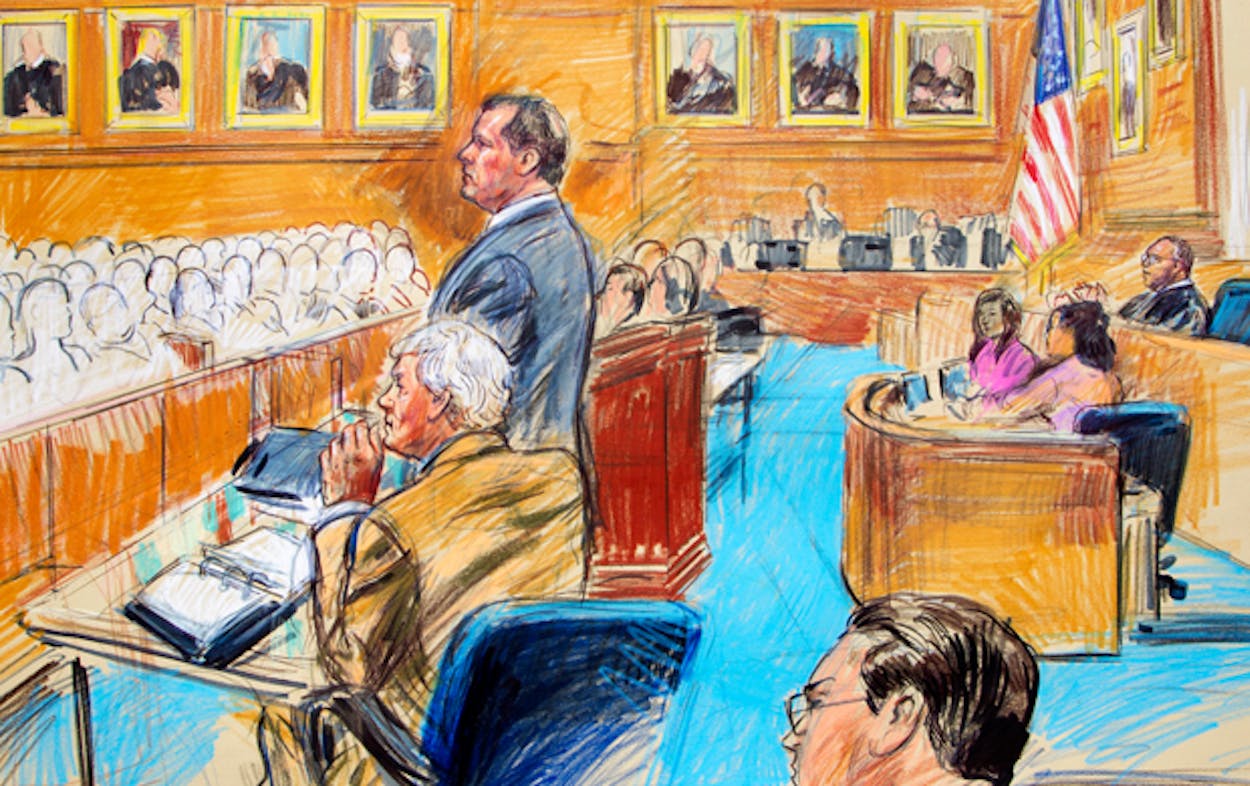Jury selection began on Monday for the second Roger Clemens trial in Washington, D.C., and while the proceedings are expected to last well over a month, it’s already been an entertaining four days of courtroom chatter and maneuvers.
The Houston resident and former Astros pitching star is accused of perjury, obstruction of Congress, and making false statements during the 2008 hearings on the use of performance-enhancing drugs in major league baseball; the government’s first attempt at prosecuting him ended in a mistrial last year.
Here are a few highlights from the first week of his second trial (many of them taken from the Houston Chronicle‘s dedicated Clemens trial blog):
Beware the Internets
Judge Reggie Walton warned potential jurors Monday to stay off of the Internet, which is pretty much a standard admonition in this day and age. But for Walton, that age was sometime in 2004.
As the Chronicle‘s Elizabeth Traynor and Rick Dunham reported, the judge included MySpace in his mention of forbidden social networks.
That prompted Richard Connelly of Hair Balls to suggest that Walton also advise jurors to avoid answering machines, Prodigy, Western Union telegrams, Friendster, and Geocities.
The 63-year-old Walton later received a Twitter tutorial from a member of the jury pool, after which, according to Ann Marimow of the Washington Post, he asked that potential juror, “Are you saying you wouldn’t Tweet or be tweeted?”
Well done, Judge!
And whether he’s behind the times or not, it’s hard to argue with this observation from Walton:
[T]here are some people that are addicted to the Internet. They have to go on the Internet every day and they have to go on the Internet to find out what they heard about. You can’t do that.
Is this thing on?
As Michael O’Keeffe and Nathaniel Vinton of the New York Daily News reported, members of the media accidentally heard a private conversation between the prosecution and defense attorneys because a microphone inside the courtroom was still live.
The paper described it as “a cordial and illuminating conversation” about which witnesses would be called, and there were no apparent repercussions. But considering the earlier mistrial, it’s a good thing it was just overheard by reporters and not jurors.
Area man in the jury pool!
The Chronicle kept a close watch on all the local angles, as evidenced by the headlines of these blog posts:
Jurors are anonymous, but the paper also noted that the former Houston school teacher “went to Texas Southern University with the late Houston congressman Mickey Leland.”
Meanwhile, as Vinton of the NY Daily News reported:
[W]it abounded in the jury pool. One woman was asked if she’d have a problem avoiding news coverage of the trial when her husband was a big sports fan.
‘No, I don’t talk to him anyhow,’ she answered.
Paging Barry Bonds and Jose Canseco
Clemens defense attorney Rusty Hardin’s strategy will apparently include questioning the very legitimacy of the original Congressional inquiry.
As the Chronicle‘s Stewart M. Powell and Regina Garcia Cano reported, Hardin argued in a court filing that “prosecutors must persuade jurors that the House Committee on Oversight and Government Reform was a ‘competent tribunal’ operating within the ‘proper exercise of the power of inquiry.'”
One implication to this line of argument is that the true purpose of the hearing was to produce a perjury indictment, not actually investigate the issue.
Clemens “cannot have it both ways,” prosecutors said in a legal document filed with the court. “He cannot on the one hand impugn the integrity of the (House Committee on Oversight and Government Reform) suggesting that its true -– singular -– motive was a perjury indictment of (Clemens) but on the other hand preclude the United States from explaining to the jury for example that the committee’s legislative work was of national importance because of the wide-spread problem of steroid and other performance enhancing drug use in major league baseball.”
That could lead to the prosecution bringing in such major PED-era baseball stars as Barry Bonds or Jose Canseco, both of whom are already on the witness list.
Bonds was convicted of obstruction of justice in a federal court last year as part of the BALCO performance-enhancing drug investigation, while Canseco infamously admitted to steroid use–and implicated many other players–in his books Juiced and Vindicated.
As Jeff Schultz of the Atlanta Journal-Constitution tweeted:
Barry Bonds and Jose Canseco are possible prosecution witnesses in new Roger Clemens trial. Is this thing on pay per view?
— Jeff Schultz (@JeffSchultzAJC) April 16, 2012







